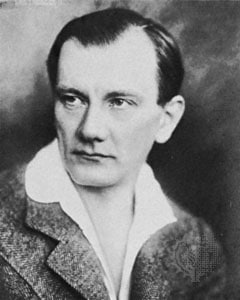An opera about my auntie
Album Of The WeekFrom the Lebrecht Album of the Week:
It is hard to take entirely seriously a man who wrote a comic opera about his auntie, Tante Simona, a stage hit in 1912. The music fusses more than it fizzes, conjuring an image of a flighty maiden aunt who’d do anything for a flicker of attention. The skill that goes into this score is, judging by the overture recorded here, tremendous. Ernö von Dohnanyi must have known the instruments of the orchestra like the hairs on the back of his hand….
Read on here.
And here.

En francais ici.
In Czech here.
In Spanish here.
In The Critic.





Maybe it’s just me, but I found that review a little confusing. Positive in the end, but I can’t quite figure out why. (Rotten edit job on My Scena, too).
I posted a critique of the review, but it seems to have been rejected. I would just say that American Rhapsody is not connected with a citizenship application and is not trying to be like Dvorak’s New World Symphony, but is in fact a 15-minute piece written for the 150th anniversary celebration of Ohio University, at the suggestion of its President, John Baker; it includes more than one folk song; and the comparison, if one had to be made, would be more with Brahms Academic Festival Overture.
The review strikes me as damning with faint praise. Dohnanyi was a superb composer, and though I’m more familiar with his chamber than his symphonic music, the string trio, two piano quintets, and the sextet for mixed instruments are all first-rate.
Better than praising with faint damns, I suppose.
NL is having fun with “an opera about his auntie”, but of course it is not! In case anybody cares, the libretto is by Victor Heindl, and here is a synopsis: https://www.opera.hu/en/programme/megtekint/simona-neni-a-cremonai-hegedus-online-premier-2020/eloadas-202101301900/#synopsis
Dohnanyi is a better composer and a more interesting figure in music history than this somewhat dismissive review suggests.
“No concrete evidence of collaboration [with the Nazis] was ever presented” — probably because there wasn’t any; indeed there is evidence of his resistance to anti-semitism and of his helping many Jews to escape (James Grymes, author of Violins of Hope, has researched this matter).
A minor point: Dohnanyi was professor at the Florida State University, Tallahassee (the University of Florida is in Gainesville).
A few comments are, I think, in order.
(1) I’m not familiar with Tante Simona, but if it was already a Budapest stage hit of Franz Josef’s time, I doubt that the title character’s relationship to Dohnányi (if any) was significant. Trivializing the opera by making it seem as though he wrote it about his “auntie” seems unnecessary.
(2) Dohnányi lost not one but two sons in World War II: Hans, who was secretly recording evidence of Nazi crimes while serving as a German judge (appointed to the bench well before 1933) and worked together with Bonhoeffer, and Mátyás, who died as an enlisted Hungarian soldier on the Russian front.
(3) The charges of collaboration against Dohnányi were without foundation. Yes, he continued in his posts as rector of the Liszt Academy and music director of the Budapest Philharmonic and Hungarian Radio under Horthy, but he was active in protecting Jewish and other threatened colleagues. For example, he was ordered to fire all the Jewish musicians in the Philharmonic in 1943. He coolly conducted a last concert with them in November, incidentally premiering his “Suite en valse” to offer a bit of musical solace to the public, and then announcing that if the Jewish musicians would not be allowed to perform, then neither would any of the other musicians – and he disbanded the Philharmonic. He later sought hosts to hide many Jewish musicians during the Eichmann deportations and the later brutalities of the Arrow Cross regime that followed Horthy’s ouster.
(4) Yes, Dohnányi decamped to rural Austria ahead of the Russian forces, and that was the immediate pretext for charges to be brought against him by people currying favor with the new Soviet occupiers. Musicologist James Grymes, author of the definitive life of Dohnányi, believes that his efforts to protect his Jewish (and left-wing) colleagues for as long as he did merit the epithet “heroic”. I haven’t the knowledge to decide if that is exaggerated or not, but a near-universal consensus today considers his actions to have been honorable. It would be a mistake to lump him together with, say, Furtwängler in Germany.
(5) As for his American Rhapsody, I personally find it to be among his weakest efforts; perhaps Paternostro’s performance can persuade me otherwise, but I’m not expecting it to do so. I completely agree with NL’s high praise of Dohnányi’s powers of orchestration. They are at their height in his “Suite in f sharp minor”, his “Symphonic Minutes”, and his second symphony. His symphonic cantata, “Cantus Vitae”, suffers from criminal neglect; it is probably his masterpiece. (Dohnányi supplied it with his own German singing translation, so the original Hungarian text is no excuse…)
Absolutely in order, thank you for your balanced information.
Tante Simona was actually first performed in Berlin, in 1913, as a light companion piece for the much more successful Pantomime, Der Schleier der Pierrette (and before NL gets excited, this is not a knockabout children’s pantomime of the English Christmas variety), by Arthur Schnitzler, music by Ernst von Dohnanyi (his op.18). Amazingly, the text of the Pantomime is available on Project Gutenberg: https://www.gutenberg.org/files/31842/31842-h/31842-h.htm
(Information from Ilona von Dohnanyi’s biography, Ernst Dohnanyi: A Song of Life, ed. James A. Grymes, 2002)
Thank you, Marfisa, for correcting me on Tante Simona; I looked it up after I’d posted and realized my error.
The pantomime is interesting, not least in aspects of Schnitzler’s scenario that eerily anticipate bits of Lengyel’s scenario for Bartok’s Miraculous Mandarin. (Of course, Mandarin was far more daring, both dramatically and musically.)
DIdn’t Boris Goldovsky call this one of the few great comic operas of the 20th century?
I’ve been enjoying this on youtube:
https://youtu.be/qjtzUQd4pZY
– together with the Suite and Serenade. Thoroughly enjoyable music, beautifully played and excellently recorded! Thanks so much for the recommendation Norman.
Thought it was about YOUR Aunt, Norman!!! A bit more interesting – lol!
Dohnanyi’s orchestral music has been rare in concert performances for decades — even the “Variations on a Nursery Theme,” which does survive on disc (including at least one played by the composer).
However, his chamber music is still programmed in the U.S. Early in 2020 the sextet with piano and horn was played in the Dumbarton concerts here in Washington, and in 2019 I heard a trio played at Eagle Rock in Maine.
That sextet from the 1930’s has received recent recordings — the one by Andres Schiff and the Takacs was featured on WETA radio this year. Dohnanyi’s first piano quintet, admired by Brahms, is available with Marc-Andre Hamelin (on Hyperion) as well as Sir Andres (on Decca).
The sonority the piano / horn sextet often suggests a full orchestra. And the final movement, including jazz themes and a drunken waltz, will leave you humming.
Yes, Brahms admired the first piano quintet, but the second is far the better work, IMHO. Written at about the start of the first world war, it shares a thematic link with his second symphony, written toward the close of the second world war.
Well, it’s Sunday morning here in Washington, and the “Variations on a Nursery Theme” is on WETA radio. The pianist is Eldar Nebolsin, with the Buffalo Philharmonic led by JoAnn Falletta. A Naxos recording.